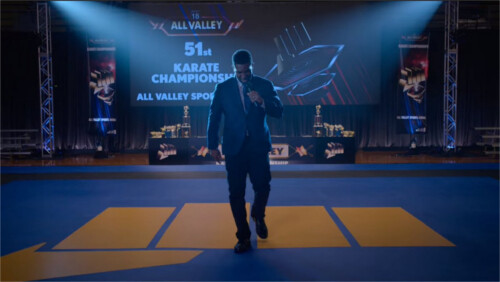Can 'Cobra Kai' Please Hire Someone to Help It With Its Japanese?

2021 was more like getting an ice-cold enema in the basement of an abandoned asylum for crazed horses. I believe the metaphor requires no further explanation. Cobra Kai tried to at least end the whole thing on a somewhat positive note by releasing the fourth season of the Karate Kid sequel/reboot/remake on December 31. And they really tried to usher in the new year in the best way possible with a show that keeps getting better and better because it’s being made by fans who look at the original Karate Kid the same way this All-Valley Committee member looks at his blue mats.

Netflix
One tiny nitpick, though … which, depending on how you look at it, isn’t really that tiny (obligatory “that’s what he said.”) Seeing as Cobra Kai is centered around a Japanese martial art—unlike the other Karate Kid remake—would it be too much to ask for it to get the Japanese writing on its props right? It all started with the boulder in Daniel LaRusso’s garden, which says something like, “Jealousy reveals a garden with no rocks.”

Netflix
Here’s the problem. Although it’s grammatically correct, that is not an existing saying in Japan. In fact, if you Google the original phrase, you will mostly find Japanese people asking what the heck that sentence is supposed to mean. It’s clearly something that started its life in English as a way to emulate a Japanese esthetic. But … why? Japan has so many real proverbs, and a lot of them would actually make thematic sense in the world of Cobra Kai.
The very real Japanese saying “老いては子に従え,” for example, means “Be guided by your children when you are old,” which would fit so hard into the show’s themes of Daniel and Johnny passing on the torch to the next generation of karate psychopaths. Hell, one of the big moments in the season 4 finale was Daniel’s daughter bringing the two former rivals together by combining their teachings. Also, I feel like a dick for bringing it up cause my Japanese looks like it was written drunk on a Soviet washing machine with an unbalanced load, but … those boulder characters could have been a tiny bit neater. But, hey, it’s just a random background prop, so no big deal, right? Maybe. But the Dragon scroll, on the other hand …

Netflix
The scroll supposedly lays out the secret to some ancient Miyagi-do move. It was first shown on Season 3 and then made a brief appearance on Season 4, meaning that Cobra Kai is saving it for some special occasion. It’s clearly going to be a big part of the plot. That’s why more work should have gone into making it. For one, those characters are written in a very modern style. As recently as the late 19th century, Japanese calligraphy had a very distinct … noodle look to it. Like ramen. The Dragon scroll does not look like ramen.

Also, not to bore you with the technical details, but there’s at least one grammatical error on the scroll, the writing uses the polite form of Japanese (you’ll see why that makes it sound off in a moment), and some of its word choices are just weird. It kind of looks like machine translation but not a good one like Google. Does Bing Translate exist? It sounds like that.
It doesn’t even make sense. The scroll says, “The chosen one will use the roar of the shisa (a mythological Okinawan beast) to stop the dragon’s heart. But please be aware. Those who use it may possibly end up facing death.” That’s not a martial arts instruction. That’s a mistranslated sign from a hotel toilet mixed with a line from a free-to-play mobile RPG with a faux-East Asian esthetic where the female characters’ armor weighs less than 1lbs.
The weird thing is, Cobra Kai did have a genuinely great portrayal of Japan in Season 3 when Daniel travels to Okinawa and finds out that the little village he used to know modernized to survive.
Revitalization of Japan’s remote, rural areas is a BIG deal in Japan, and I thought the show handled it well by keeping things authentic and not fetishizing Japan or giving us a purely Western perspective on it. It’d be nice to see the same approach to the show’s Japanese writing. Come on, Japanese translators who also understand Japanese culture aren’t that expensive. Call me, Netflix. I’ll give you a good price because I love Cobra Kai. Hope it keeps true to its motto and never dies.
Follow Cezary on Twitter.
Top Image: Netflix